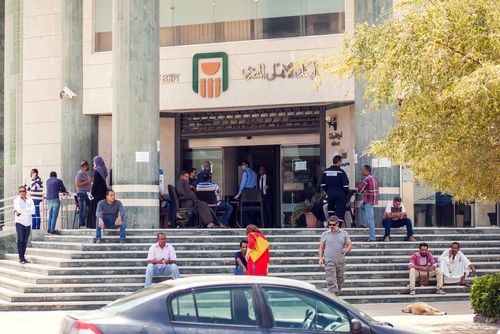Egyptian banks make big inroads in digital technology
Egyptian banks have enhanced their digital services, especially since the corona pandemic. According to a statement by the Central Bank of Egypt, the National Bank of Egypt has implemented 13 programmes to enhance financial inclusion. These financing programmes have reduced the number of days taken for obtaining loans to between 5 and 7 days compared with 14 days previously.
The concept of financial inclusion has spread in Egypt in recent years. Financial inclusion has social benefits in that it caters for the poor and marginalised, which is in line with the Egyptian government's directions and Vision 2030. Financial inclusion also has economic benefits, especially with its focus on small, micro and medium companies. An example would be the initiatives adopted by the Central Bank to offer real estate financing for the low-income.
Overall, financial inclusion contributes to facing the challenges of poverty, unemployment and development, and represents an important link to generating job opportunities and mitigating the impact of economic and financial fluctuations.
Yahya Aboul Fotouh, chairman of the National Bank of Egypt, said that the financial inclusion programmes includes a livestock-breeding programme with financing available of up to EGP 2 million (USD 127,234); several programmes worth EGP 5 million for financing medical supplies, and other programmes, such as one for groceries, with available finance of up to EGP 3 million.
Fotouh said that since the financial inclusion programmes were launched three months ago more than 15,000 clients have benefited from them. They are worth about EGP 7.5 billion in total, he said, adding that loans for financial inclusion programmes are part of the Central Bank's initiative for small, medium, and micro enterprises.
The National Bank has provided many digital banking products and services, including internet banking for individuals and companies, Fotouh said, adding that the number of individual subscribers has reached about six million. About 63,000 companies have also been reached. On top of this, there is the service that transfers workers' funds abroad through a mobile phone. These funds can be disbursed at the automated teller machine network (ATM).
At the beginning of 2020, the bank also launched its mobile application, NBE Mobile/Al-Ahly Net. NBE's mobile service for individuals offers the bank's customers with an advanced, easy and secure banking experience, according to the bank. In addition to the Quick Response Code (QR) service through the electronic wallet. Al-Ahly Phone Cash was launched in April 2020. At last June, this service had 1.7 million wallets, and the volume of financial transactions had increased by 200% compared to the same period the previous year. There was also more emphasis on attracting more young people to the bank, as well as those not dealing with the banking system sufficiently. In this way, the bank hopes to acquire 60 per cent of the e-commerce market in Egypt, as measured by total volume.
Ehab Dorra, head of retail banking at Banque Misr, has also announced that the bank had 315,480 points of sale (POS) by the end of July 2021. This enhances financial inclusion, he said, adding that the number of individuals using its internet banking service rose to 842,700 subscribers at the end of last July, compared to about 500,000 subscribers during the same period the previous year. Dorra indicated that the abolition of the requirement to go to the bank to activate the banking internet service by the Central Bank contributed significantly to increasing subscriptions and transactions for this product.
He also said that the number of Banque Misr Wallet customers jumped to 1.554 million customers at the end of July 2021, compared to about 817,000 customers at the same period in 2020. The ATM network of Banque Misr reached 3,826,000 machines spread across all governorates in Egypt. He added that the retail-banking portfolio reached EGP 67.875 billion at the end of July 2021.
Mohamed Farag, chief digital officer, at Commercial International Bank (CIB), said that digital banking transactions via the mobile phone increased 116 per cent during the first half of 2021, compared to the same period in 2020. CIB also increased the number of subscribers to the online banking service for individuals by 34 per cent, and the number of subscribers to the smart wallet application by 25 per cent. Consequently, the value of transactions made through the smart wallet increased by 174 per cent, to reach EGP 2.7 billion. This confirms high customer demand for digital services, Farag said.


Comments